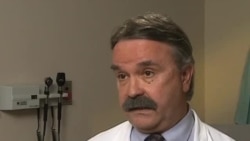Former South African president Nelson Mandela entered the hospital on June 8 with a lung infection. For a while, his doctors said he was improving. But on Sunday, they said his condition had become critical. Recurring lung infections is a serious medical condition in elderly patients and it raises many issues for doctors as well as families.
South Africans and admirers around the world expressed their feelings for Nelson Mandela, also known by his clan name of Madiba, the man identified with transforming South Africa from white minority rule to a multiracial democracy.
"It's very emotional, and I feel for my children. This is very important for them to feel what an amazing man Madiba was and is to all of us," said a woman in Johannesburg,
But some South Africans also believe "It's time to let him go."
Mandela suffered from lung infections during his 27 years in prison under apartheid. The infections he has had over the past few years are commonly called "pneumonia," whether they're caused by a virus or a bacteria.
What makes his condition more serious is that repeated infections can weaken an elderly patient's lungs.
"Those bacteria are often much more aggressive. Often they are more resistant to antibiotics because, over the years, elderly people will have had more exposure to antibiotics and will have selected out resistant and stronger strains," explained Dr. Bohdan Pichurko, who is with the Cleveland Clinic.
Dr. Pichurko said treatments for the young are not always good for the elderly.
"Illness such as pneumonia puts stress on other organ systems. And so we worry about worsening diabetes, kidney function, liver function. Many of those can deteriorate when we are doing our best to treat a respiratory infection," he said.
Although some people have said Mandela should be allowed to die, Dr. Pichurko said the decision to end treatment is never easy.
"The best decision is made in partnership between patient and doctor. The doctor is ethically obligated at some point, if that point is reached, to indicate when medical treatment may be futile," he explained.
Dr. Pichurko added that age is a factor, but only a minor one. Some people are healthy at 95. Others are not. For the elderly, it's important to try and prevent exposure to viruses or certain bacteria. And if an infection does occur, to get good medical care within 48 hours.
South Africans and admirers around the world expressed their feelings for Nelson Mandela, also known by his clan name of Madiba, the man identified with transforming South Africa from white minority rule to a multiracial democracy.
"It's very emotional, and I feel for my children. This is very important for them to feel what an amazing man Madiba was and is to all of us," said a woman in Johannesburg,
But some South Africans also believe "It's time to let him go."
Mandela suffered from lung infections during his 27 years in prison under apartheid. The infections he has had over the past few years are commonly called "pneumonia," whether they're caused by a virus or a bacteria.
What makes his condition more serious is that repeated infections can weaken an elderly patient's lungs.
"Those bacteria are often much more aggressive. Often they are more resistant to antibiotics because, over the years, elderly people will have had more exposure to antibiotics and will have selected out resistant and stronger strains," explained Dr. Bohdan Pichurko, who is with the Cleveland Clinic.
Dr. Pichurko said treatments for the young are not always good for the elderly.
"Illness such as pneumonia puts stress on other organ systems. And so we worry about worsening diabetes, kidney function, liver function. Many of those can deteriorate when we are doing our best to treat a respiratory infection," he said.
Although some people have said Mandela should be allowed to die, Dr. Pichurko said the decision to end treatment is never easy.
"The best decision is made in partnership between patient and doctor. The doctor is ethically obligated at some point, if that point is reached, to indicate when medical treatment may be futile," he explained.
Dr. Pichurko added that age is a factor, but only a minor one. Some people are healthy at 95. Others are not. For the elderly, it's important to try and prevent exposure to viruses or certain bacteria. And if an infection does occur, to get good medical care within 48 hours.





